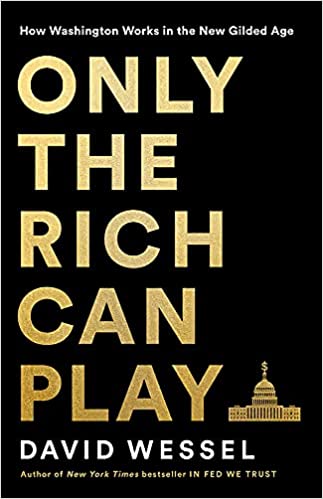You have /5 articles left.
Sign up for a free account or log in.
 Only the Rich Can Play: How Washington Works in the New Gilded Age by David Wessel
Only the Rich Can Play: How Washington Works in the New Gilded Age by David Wessel
Published in October 2021
The machinery of inequality can seem invisible. The structures that privilege the wealthy over others can be challenging to identify, as they are deeply embedded and entrenched in our political, economic and educational systems.
What David Wessel does in Only the Rich Can Play is to diligently tug on all the strings of a piece of innocuous-seeming Trump-era legislation and then look at the results once the story has been unraveled.
The legislation in question is a tax break for investing capital gains in designated Opportunity Zones (shortened to OZs), which became law as part of Trump's 2017 tax legislation. The law allows for the profits from capital gains to be invested in real estate or a business located in one of the country's 8,766 census tracts designated as an Opportunity Zone.
OZs are places designated as distressed on measures of poverty and income. Investments in an OZ can bring substantial tax savings on a capital gain, such as those generated by the sale of a stock or a business. As only wealthy people typically realize a large capital gain, the OZ tax break almost exclusively benefits the already rich.
The idea of OZs is to funnel capital into cities, neighborhoods and rural areas with high rates of concentrated poverty that have been left behind by economic change. As Wessel details at length in Only the Rich Can Play, the vast majority of OZ investments do not benefit the people living in poor areas. Instead, the way the program is structured allows OZ money to flow into projects that would have already been attractive to investors and do not offer much benefit to residents of distressed neighborhoods.
The higher education angle of the Opportunity Zone legislation is fascinating. Places in which colleges and universities are located tend to show up as low income and high poverty. This is because residential students, who have little or no income, are counted as residents. The OZ tax break has made it attractive for investors to back luxury student housing projects adjacent to campuses. As parents are often co-signers of a student lease, a private luxury residence hall aimed at students can be a relatively high-profit and low-risk proposition.
The entire story of how OZs were born, became law and have been implemented is fascinating. Wessel does a superb job of starting the story at the beginning (weirdly, a brainstorm of Napster co-founder Sean Parker), to the legislation's path through Congress, on then into the hands of real estate developers and money managers.
If you are interested in how money works in politics and the opportunities that the wealthy have to avoid paying taxes, you will find Only the Rich Can Play a gratifying (if maddening) book to read.
What are you reading?








